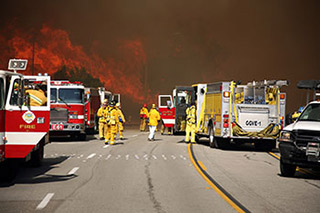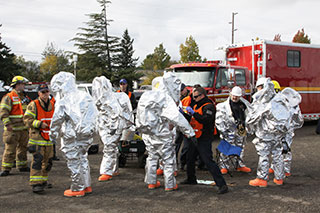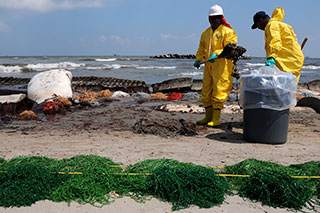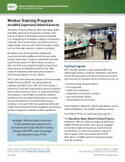Introduction

Environmental emergencies, including hurricanes, floods, wildfires, oil spills, chemical spills, acts of terrorism, and others, threaten the lives and health of the public, as well as those who respond.
Responders are normally the first on the scene of an emergency, and range from police, fire, and emergency health personnel, to community volunteers. As they work to bring the emergency under control, and save lives and property, they may expose themselves to potentially harmful conditions and contaminants.
What is NIEHS Doing?
While emergencies range in size, location, cause, and effect, most have an environmental component. Organizing, coordinating, and directing available resources, to minimize the impact of the event on the community and environment, is vital.
NIEHS addresses these needs through research, training, and other response efforts. By utilizing the data collected and learning from these events, NIEHS also supports future research and helps develop resources for wider use.
Proactive Training
The Worker Training Program funds nonprofit organizations and universities that have a demonstrated track record of providing successful occupational health and safety training.
Grant support allows NIEHS-funded researchers to lend their expertise and perform vital studies to be better prepared for, and more quickly respond to and recover from, disasters and other public health emergencies.

Through the NIH Disaster Research Response (DR2) Program, NIEHS helps develop new strategies, tools, and processes to support the collection of time-critical information after a disaster, to help save lives, speed up recovery, and improve our ability to handle future disasters.
Across all types of emergencies, responders have short-term and long-term needs related to their mental health and resilience. The Worker Training Program, with support from the Substance Abuse and Mental Health Services Administration, offers training in English and Spanish for workers, supervisors, and health care providers, to address these critical, but often overlooked, health needs.
The Worker Training Program also offers online information, including training modules, webinars, booklets, and fact sheets to prepare workers for emergency situations.
Research to Understand the Health Impacts of Disasters
In-house, NIEHS scientists perform research to help inform health officials, workers, and communities about exposures to contaminants, and how to reduce risks, illness, and injuries.
The National Toxicology Program participated in the response to the West Virginia Elk River chemical spill in 2014, utilizing several experimental approaches to predict the toxicity of chemicals present in the Elk River, which serves as the water source for about 300,000 people in the Charleston area.
NIEHS-supported research is geared toward understanding the health impacts of disasters, to improve disaster responses, reduce health impacts, and prevent future harm through timely research.
Through the NIEHS-led Deepwater Horizon Research Consortia, four universities partnered with 45 community organizations to ensure that research done by the universities related directly to the needs of local communities in the Gulf Coast region.

The Gulf Long-term Follow-up Study is larger and has been conducted for a longer time than research on other oil spills. The purpose of the study is to examine the health of persons involved in the response and clean-up efforts. Its defining feature is the level of detail obtained on potential oil-spill exposures and the extensive efforts made to characterize the exposures of those who helped the clean up following a major environmental, and potential public health, disaster.
A special issue of the journal Annals of Work Exposures and Health, published in April 2022, has 14 articles of research findings from the study. Readers may glean information on how to approach such studies in the future and how to prepare plans to reduce harmful exposures for clean-up workers. Because spills continue, learning from the Deepwater Horizon response is important.
Research will continue under this study with plans to follow these workers and note any other health effects that are associated with exposures from the oil spill cleanup.
Further Reading
Stories from the Environmental Factor (NIEHS Newsletter)
- Responding to the East Palestine, Ohio, Train Derailment (March 2024)
- Grantees Create Framework to Report Back Environmental Health Results (February (2024)
- Keystone Lecturer Highlights Alabama Fire College Tribal Training (August 2023)
- Oil Spill Cleanup Workers More Likely to Have Asthma Symptoms (September 2022)
- GuLF Study Describes Inhalation, Dermal Exposures for All Oil Cleanup Job Roles (June 2022)
- Hazards of Disaster Cleanup, Support for Workers Focus of NIEHS Talk (January 2022)
- After Disasters, Scientific Partnership and Local Engagement Are Key (July 2021)
- NIH Disaster Research Response Program Launches New Website (June 2021)
- Hurricane Experience Benefits Later Industrial Fire Research Response (May 2021)
Additional Resources
- The National Institute for Occupational Health and Safety's Disaster Science Responder Research Program has developed an approach that will allow for timely and scalable responder-based research that can be implemented before, during, and after a disaster.




